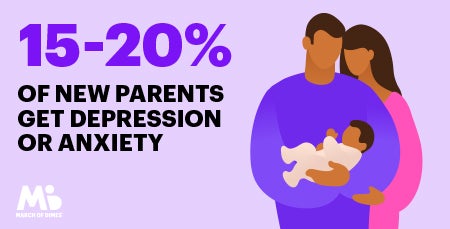Childbirth affects more than your physical health. Your mental wellbeing can also be affected by shifting hormones that trigger all sorts of emotions. But while 80 percent of new parents go through mild mood changes, including the baby blues, 15 to 20 percent will face more serious mental health issues.

Ask yourself these questions:
- Do you feel sad, depressed or anxious?
- Are you having trouble bonding with your baby?
- Are you lashing out at friends and family?
- Are you having trouble eating or sleeping?
- Do you feel like you never should have become a parent?
- Are you worried you might hurt yourself or your baby?
If you answered “yes” to any of these questions, you might be suffering from a postpartum mood or anxiety disorder. This is nothing to be ashamed of. Parents of every race, culture, age and income level can develop a mental health condition, with symptoms showing up any time within twelve months of giving birth. But you don’t have to suffer in silence. If you think you’re suffering from a mental health issue, talk to your doctor as soon as possible.
Is It The Baby Blues or Postpartum Depression
What to know about postpartum depression
Postpartum depression (PPD) is the most common medical problem for new moms, affecting 1 in 7 women. With PPD, you might cry a lot, feel tired all the time and lose interest in things you love. These symptoms can make it hard for you to care for yourself or your baby. PPD can come on anytime, but it usually starts within the first one to three weeks of giving birth. PPD won’t go away on its own, but needs the right treatment for you to feel better.

Symptoms of PPD
- Crying and feeling sad or depressed
- Feelings of shame, guilt or failure
- Having severe mood swings
- Feeling tired all the time
- Changes in your eating and sleeping habits
- Loss of interest in things you normally enjoy
- Possible thoughts of harming yourself or your baby
Risk factors of PPD
- Personal or family history of depression, anxiety or PPD
- No help or support in caring for your baby
- Money or marriage problems, or any other life stress
- Problems during pregnancy or childbirth
- Having trouble breastfeeding
- Giving birth to multiples
- Having a baby needing intensive care
- Having a thyroid imbalance or history of diabetes
What to know about postpartum anxiety
It’s natural to worry about your baby, like if they’re eating or sleeping well. But if your worry seems extreme or out of control, you might have postpartum anxiety (PPA). Almost 10 percent of new moms develop PPA, either by itself or combined with depression.

Symptoms of PPA
- Constant worry
- Feeling like something bad will happen
- Changes to your sleep or appetite
- Racing thoughts
- Not being able to sit still
- Hot flashes, dizziness or other physical problems
Risk factors of PPA
- Personal or family history of anxiety, depression or thyroid imbalance
- Previous pregnancy loss or death of an infant
- History of intense mood-related symptoms with your period
- History of an eating disorder or troubled relationship with food
What to know about post-traumatic stress disorder
Going through labor and delivery can make you feel helpless in the moment and lead to post-traumatic stress disorder (PTSD), especially if medical problems arise. Almost 9% of new moms suffer from PTSD—almost as much as postpartum anxiety.

Symptoms of PTSD
- Vivid flashbacks or nightmares about the trauma
- Anxiety and panic attacks
- Avoiding anything that reminds you of the birth
- Not feeling connected to your life
Risk factors of PTSD
- Unexpected Cesarean birth
- Use of forceps to deliver your baby
- Having a baby in the intensive care unit
- Feeling powerless or a lack of support during the delivery
- Being a victim of a previous traumatic event
- Suffering a physical injury while giving birth
How to seek professional help
If you think you’re suffering from a postpartum mental health issue, talk to your doctor right away. There are many treatments available to you, including:
- Prescription medicine
- Therapy with a mental health specialist
- Alternative treatments, like acupuncture (tiny needles inserted into key points of your body)
- Cognitive behavioral therapy, which teaches you how to look at negative thoughts in a different way
- Mindfulness techniques to help you focus your thoughts and feelings in the moment
- Online or in-person support groups
If you’re ever worried about hurting yourself or your baby,call 911 or go to the nearest emergency room.
Reviewed March 2023